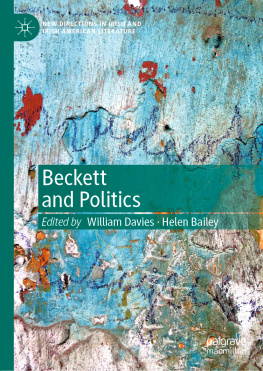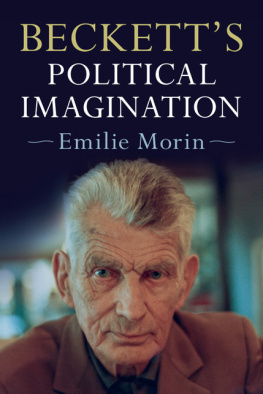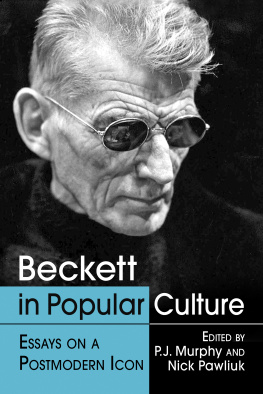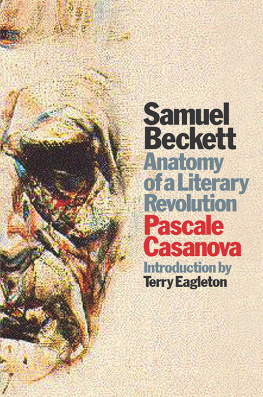Beckett Dantes
To Ruby Cohn, Carla Locatelli,
and John Pilling,
my buoni maestri
Becketts Dantes
Intertextuality in the fiction and criticism
DANIELA CASELLI
Copyright Daniela Caselli 2005
The right of Daniela Caselli to be identified as the author of this work
has been asserted by her in accordance with the Copyright, Designs and Patents Act 1988.
Published by Manchester University Press
Oxford Road, Manchester M13 9NR, UK
and Room 400, 175 Fifth Avenue, New York, NY 10010, USA
www.manchesteruniversitypress.co.uk
Distributed exclusively in the USA by
Palgrave, 175 Fifth Avenue, New York,
NY 10010, USA
Distributed exclusively in Canada by
UBC Press, University of British Columbia, 2029 West Mall,
Vancouver, BC, Canada V6T 1Z2
British Library Cataloguing-in-Publication Data
A catalogue record for this book is available from the British Library
Library of Congress Cataloging-in-Publication Data applied for
ISBN 978 0 7190 7156 0
First published 2005
14 13 12 11 10 09 08 07 06 05 10 9 8 7 6 5 4 3 2 1
Typeset by
D R Bungay Associates, Burghfield, Berks
Printed in Great Britain
by CPI, Bath
Contents
Acknowledgements
Many people have contributed to the making of this book. Carla Locatelli first kindled my enthusiasm for Beckett, and her inquisitive mind has never stopped being a source of inspiration. I am grateful to John Pilling for sharing with me some of his staggering knowledge of Beckett, and for his academic thoroughness, high standards, and witty criticism, which have taught me a lot over the years. Ruby Cohns insight and rigorous scholarship have guided my work, and her friendship and generosity have made it all possible.
I would like to thank the expert staff at the Beckett International Foundation Archive at Reading University Library, and especially Mike Bott and Julian Garforth for their good humour and kindness, and the Library staff at Trinity College Dublin. My gratitude goes to Edward Beckett for granting permission to quote from unpublished material, to James and Elizabeth Knowlson for their help in reading manuscripts, to Zygmunt Baranski for his advice on matters relative to Dante, and to Anna Dolfi for her support over the years.
Instrumental to the writing of this book was the climate of friendship and real intellectual exchange created by Karn Lesnik-Oberstein, Jonathan Bignell, Stephen Thomson, Ciarn OKelly, Sue Walsh, and all the other members of the Cultural and Critical Theory Group at the University of Reading. I am grateful to Jonathan Bignell at the University of Reading and Erica Burman at Manchester Metropolitan University for their generosity and infectious intellectual enthusiasm and to John and Christine Bolland, John Sears, and Patricia Allmer for their advice and help when I most needed it. The School of English, Sociology, Politics and Contemporary History at the University of Salford provided me with a friendly, supportive, and stimulating working environment, which helped me complete this book and plan others.
My gratitude goes to my mother, Maria Luisa Pustetto, and to my father, Fulvio Caselli, for their unfailing support and encouragement to do what I liked most and to stick to it. My sister, Silvia Caselli, has shared joys and anxieties to do with this book and with much else besides, helping me by showing me how integrity, energy, and lightheartedness can work together.
I would also like to thank those friends whose input contributed to the making of this book in so many ways: Mara Zardini, Andrea Pappacena, Gabriele Troilo, Barbara De Rigo, Marisa Basile, Rezzonica Castelbarco, Alberto Ottieri, Peter Buse, Nria Triana-Toribio, Cathy Gelbin, Riccardo Capoferro, Paul Bavister, Laura Hubner, Kaye Mitchell, and Laura Salisbury.
This book could not have been written without Karn Lesnik-Oberstein, an intellectual companion who constantly stretches my thinking and reminds me what scholarship is really about, and a great friend who has always been there for me.
To Emanuele Basile goes my love.
Introduction
There were no pictures on the wall, no obvious amenities, only a narrow bed, a desk and a table with several books, including a dictionary. In the midst of this spare impersonal setting, a single object seemed to stand on its own. One book lay open on the table, close enough so that Gussow could see the notations in the margin. This book was, Beckett told him, his schoolboy copy of Dantes Divine Comedy.
Dante is a strange object in Beckett studies; it stands out and stands for Becketts greatness and isolation. This single object breaks the disquieting impersonality of the setting; it evokes a nostalgia for times gone by, and it confirms the intellectual rigour of the author. Dantes presence is pervasive in Beckett studies. The student edition of the Comedy appears not only in Becketts work as the beslubbered Salani edition Most importantly, however, references to Dante and the Comedy are scattered throughout the Beckett oeuvre.
But what does Dante do in Beckett and for Beckett? This book hopes to answer these questions by arguing that Dantes presence in Beckett is part of a critique of value and authority. Quotation, source, and origin are notions which are commonly read as positing the authority of a previous text, which supplies a later text with meanings while remaining autonomous and stable. This can be observed in most existing studies on Beckett and Dante which, while theorising the instability of Becketts texts (often praised for lending themselves to many complex and conflicting interpretations), oversimplify and ultimately stabilise Dante as an authoritative predetermined meaning, reading him for instance, as symboliz[ing] the cultural heritage of Western civilization, or as a devout Christian whose values and theology are subverted by Beckett.source and end product. Most significantly, these different Dantes are part of a larger internal (intratextual) strategy of reduplications, mirrorings, echoes, and mises en abyme which shape the Beckett corpus. It is my contention that Dante is assumed as an external source of literary and cultural authority in Becketts work, and also participates in Becketts texts sceptical undermining of kinds of authority. I will therefore investigate this paradoxical movement rather than simply isolating discrete, identifiable fragments of Dantes texts in Beckett and then calling them quotations, sources, origin, a strategy which has not been able to do justice to the complex ways in which this literary relation works.
Many critics have isolated fragments of Dantes texts in Becketts oeuvre.
In Beckett, the retrieval of the source (in this study finding references to specific passages from Dante) does not produce, as Michael Riffaterre would have it, a stable picture of the text., Belacqua, the protagonist of Dream of Fair to Middling Women who shares his name with the slothful character in Purgatorio IV, is at once a character and his own critique; his artificiality and the process of his fabrication are constantly foregrounded and the many layers which make up this character (references not only to the








